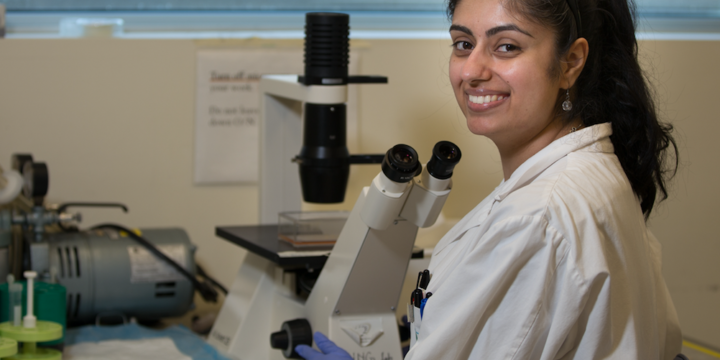Dr. Roopali Chaudhary is a scientist, entrepreneur and a mental health advocate. Her education was completed in the Indian (in India and the Middle East) and the Canadian schooling systems. She earned her undergraduate degree specializing in Molecular Biology and Molecular Genetics from the University of Toronto. She completed her MSc in Genetics from the University of Waterloo studying embryogenesis in Drosophila melanogaster (fruit flies), and her PhD in Cellular Biology from McMaster University researching inflammatory bowel disease (IBD) mouse model. Her postdoctoral research was in Immunology evaluating the immune memory in food allergies (specifically peanut allergy) at Mcmaster University. Apart from being a scientist, Roopali has founded a not-for-profit named Lotus STEMM, which is a networking and a leadership platform for South Asian women in STEMM fields. Additionally, she owns a custom cake bakery named (C6H12O6)3 i.e.SugarKube, with a passion for science-themed cakes, and “edible” science communication.
What’s the most important thing you have learned in your career?
Never shy away from a learning opportunity. If you are comfortable and know exactly what you have to do, then you’re stagnant. Let discomfort settle in, and learn to embrace it. Discomfort helps you learn more about yourself, and forces you to learn a new skill.
Did you have a mentor? If so, how did you find them and how old were you?
I’ve had many mentors in life. But, my first mentor was my mom; from a young age I saw her taking new challenges head on. Though not a woman in STEM, she is probably the strongest woman I know!
What did you want to be when you grew up and why?
From my earliest memories, I remember being fascinated by how the world works; our bodies, plants, the TV, everything was fascinating. My parents tell me that when I was 2-3 years old, I insisted (threw a tantrum) that they buy me a doctor play set. I remember my little stethoscope from which I listened to all my stuffed toys’ heartbeats. I knew I did not like taking orders, which would have made me a bad nurse. So I aimed to go to medical school with the goal of becoming a medical doctor. By the age of 5, I used to go around calling myself and making others address me as, Dr. Roopali. It wasn’t until my undergraduate degree that I actually realized that it wasn’t a medical doctor, it was a scientist’s career that intrigued and excited me. Solving puzzles was a common pastime in my house, and I grew up loving the feeling of putting two unlikely pieces together to get a bigger picture. This is not very different from the scientific method.
Are there any activities or hobbies you wish you had become involved in when you were younger that would have prepared you for the role you have today?
I wish I was more involved in science communication during my earlier years in school. Social media platforms did not exist then, and scicomm was mostly seen as science journalism. But utilizing your creativity to educate the lay audience about scientific concepts, using various mediums, is a hobby I wish I had explored more in my younger years. I now dabble in it with my bakery, and through speaking engagements, and am constantly learning (and admiring) from other scicommers.
What advice, if any, do you have for young women who wish on embarking in a STEM career?
Imposter syndrome is real. Everyone has felt it at some point in their careers. Women feel it more than men! If you think you can’t do something, or don’t deserve to be where you are, or others are smarter/better/more hardworking than you; it’s imposter syndrome, because you do deserve and you’ve worked hard to be here. You are good at what you do, which may not be the same things as your lab/workmates, but that is part of the diversity of science. Believe in yourself, and find your champions!
What’s the most important thing you have learned in your career?
Never shy away from a learning opportunity. If you are comfortable and know exactly what you have to do, then you’re stagnant. Let discomfort settle in, and learn to embrace it. Discomfort helps you learn more about yourself, and forces you to learn a new skill.
Have you developed any insights about getting more women involved in STEM careers?
Representation matters; increasing the visibility of diverse women in STEM is important to get the next generation to identify with the field. It is difficult to become something/someone if you can’t see someone like yourself in that role. Increasing visibility also encourages parents that their daughter(s) will (and can) succeed in the field. Parental influence is just as important as having mentors.
What is your advice to the industry as a whole to help close the gap for women in STEM?
Women are interested in STEM careers; it’s harder to keep them there, however. In my opinion, one of the most important ways companies and universities can support women workers/students/staff is by having on-campus subsidized childcare facility. STEM careers can require long hours, and by providing on-campus childcare facilities, women can play their important roles as mothers AND as a woman in STEM. Changing attitudes about being a mother AND a working woman will only happen when companies acknowledge this barrier in the retention of women in STEM.
How can people find out more information about you?
People can find more information on Lotus STEMM via our website www.lotusstemm.org, on Twitter at @Lotus_STEMM, Instagram at @lotustemm, LinkedIn Company Page at Lotus STEMM, and my personal LinkedIn page at Roopali Chaudhary, PhD.

